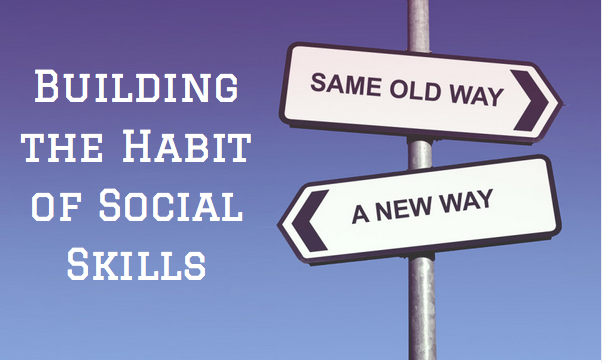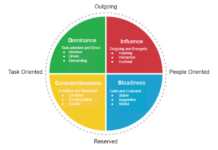
Most people accept that the world is not a meritocracy.
You can have the best credentials and resume in the world and (1) not make partner, (2) not get that promotion, and (3) not even get your foot in the door. It happens routinely, and most of the time we accept it as a result of the age-old adage Life is about who you know…
I’d like to add an addendum to that saying, that it’s not actually about who you know, it’s about who likes you.
That’s the importance of building social skills as a habit.Social skills are the greasy crowbar that will get you exactly where you want in life, even if you don’t quite belong there (at the moment).
People will move mountains for those they like, so let’s dive into some quick tips to help you build your social skills habits.
1. Eye contact
The eyes are the window to the soul. Shifty eyes. Kind eyes. Bedroom eyes.
We all hear that eye contact is important, but we almost never get advice to improve it besides to fake it ‘til you make it, which isn’t very useful.
The key to eye contact is dealing with the tension – the feeling you get when you hold eye contact with someone and have to look away out of discomfort. To do anything significant with eye contact like bedroom eyes, you need to first increase your tension tolerance – it’s the gatekeeper to connecting with people and appearing honest and trustworthy.
So how can you get over the inherent discomfort of sustained eye contact?
There’s no substitute for tackling eye contact tension besides exposure to it. Grab a pair of sunglasses and head outside to an area with foot traffic. Position yourself so that you are facing oncoming traffic. Put your sunglasses on and stare into people’s eyes as they walk by, remembering that they can’t see you. Build up your immunity to that tension in a safe space where no awkwardness can occur! Soon you won’t need sunglasses to fearlessly hold eye contact with anyone.
The interesting part is that people won’t look at your eyes for more than a split second, even though they don’t think you’re looking at them.
2. HPM
Sometimes in conversation we flat out run out of things to say.
Our minds blank for a second and awkward silence ensues. That’s why HPM is so important – it ensures that you will never run out of things to say, and will inject life back into any conversation.
HPM stands for history, philosophy and metaphor. For example, in response to a statement about puppies, you could reply with your history (personal story involving puppies), your philosophy (opinion on puppies), or metaphor (what puppies make you think of).
There are only so many ways that we answer other people, and these 3 elements are perfect to keep in your back pocket because they are things literally everyone has. They will prompt a personal response from others and perhaps they will share their own HPM.
It’s a good cheat for when your mind blanks.
3. Know your stories
Every Monday morning when you come across an acquaintance or friend, you know what you’ll probably be talking about.
That’s because certain conversation patterns arise, and you actually know most of them already. So Monday morning, what will be the first few topics discussed? Your weekend, the week, work, dates, the next weekend, vacation, your boyfriend, and so on. You’ll trade Uh-huhsand Cool, how about yous and then turn your backs and walk away.
If you’re having problems with your conversations dying and potential friends and connections losing interest in boring or generic topics, you need to know your stories.
What I mean by that is instead of answering questions about your weekend with one-word answers with no effort, do your work beforehand and construct short mini-stories for each of the questions you know you’ll be asked so you can take your conversations out of the generic and into something personal and real. When someone asks a question about you, rarely do they want to know the specific answer – they just want to hear something interesting about you. Help them, and help the conversation by giving it direction.
4. Be intensely curious
When’s the last time you were truly curious about something or someone?
I’m willing to bet that you did all you could to find out everything you could about it or them, and since you were focused on that, conversation flowed as an afterthought.
Being curious about someone means wanting to know about their motivations, intentions, hopes, dreams… and fortunately, people love expounding on these aspects of themselves. So you create a scenario where conversation flows effortlessly, and both parties are talking about something that they love.
If that doesn’t underscore the importance of curiosity, visualize Jimmy Fallon or whoever your favorite talk show host is. Their one job is to let their guests shine and give them the spotlight – being curious about them – and it makes conversation flow amazingly well as a result. Dale Carnegie put it better than I ever will – You can make more friends in two months by becoming interested in other people than you can in two years by trying to get other people interested in you.
5. REACT
Sometimes we run across people that just have somethingoff about them.
You speak to them, and they answer you normally, but there’s just something that you can’t quite place your finger on that makes the interaction a bit odd and uncomfortable.
The vast majority of the time, it’s because the other person just doesn’t react to what you say. When you talk to someone that doesn’t react to you either verbally or non-verbally, it’s like speaking to a wall. You can’t read them, and you’re not even sure that they are hearing what you have to say, much less acknowledging and understanding it.
Reacting verbally or through your facial expressions are the music to a conversation’s soundtrack – if they are removed, the scene still functions, but it feels oddly empty and disconnected. Remember, a conversation is a two-way street, and you aren’t just taking a backseat when you aren’t speaking.
Your job while listening is to show your conversation partner every emotion, no matter how small, that is being evoked by their words. It’s really as simple as showing outrage at an angry rant, and throwing your hands up in disgust when being told about the terrible traffic. Let people know what’s on your mind because they can’t read it.
Here’s the easiest way to start implementing these social skill habits immediately: find someone who embodies great charisma, whether real or fictional. Observe them and break down what they do into small components. Notice how many of the tips here they instinctually use, and see how they are applied in real life. Then go practice these tips with a cashier or barista; someone who provides a safe space for social interaction.
Social skills take a life to master, but it’s well worth it when you realize the value of interpersonal capital.
Originally posted at DevelopGoodHabits.com, a top 100 personal development blog.





